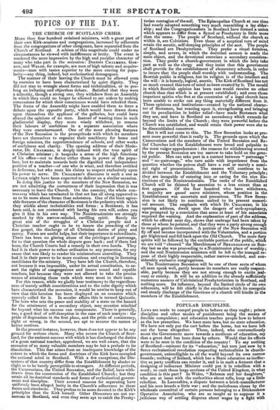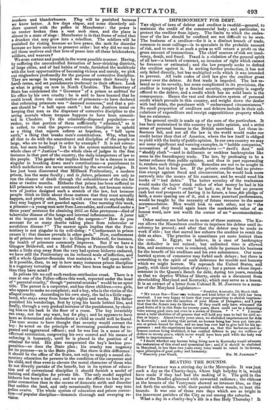POPULAR DISCIPLINE.
Laws are made to compel people to behave as they ought ; prison discipline and other modes of punishment being the means of forcible compulsion ; and education teaches people how to behave as the law prescribes. We have state laws, but no state education. We have not only put the cart before the horse, but we have left out the horse altogether. Those, indeed, who contumeliously scout the Government move towards a modicum of education, say that a great deal has been done by others. Would that its effects were to be seen in the condition of the country ! To say nothing of Scotland—eminent for its "education," but torn just now by a fierce ecclesiastical revolution respecting technicalities in church- government, unintelligible to all the world beyond its own narrow bounds; nothing of Ireland, which has a State education as ineffec- tive as party conflicts can render it, and is in such a ferment that a designing or indiscreet Minister could put it in rebellion with a word ; to omit those large sections of the United Kingdom, in what condition is this part ? In Wales, " Rebecca and her daughters," who are at issue with the authorities about tolls, keep up a little rebellion. In Lancashire, a dispute between a brick-manufacturer and his men breeds a little war ; and the melodrama closes by the wholesale committal of certain persons belonging to a Brickmakers Operative Association, who are so taught as to suppose it a judicious way of settling disputes about wages by a fight with muskets and blunderbusses. They will be punished because we know better. A few days elapse, and some disorderly sol-
diers quarrel with the police in Manchester : the peace is no sooner broken than a vast mob rises, and the place is almost in a state of siege : Manchester is in that frame of mind that
a drunken riot may grow into a rebellion. The soldiers will be punished for rioting because we love peace, the mob for disorder because we have motives to preserve order : but why did we not in- stil those motives and that love of peace into all these brickmakers, soldiers, and weavers ?
We even correct and punish in the worst possible manner. Having, by suffering the uncontrolled formation of beer-drinking districts, of large cities, and of bad habits of trade, furnished the multitude with the best opportunities of becoming vicious and unruly, we pick out ringleaders professedly for the purpose of corrective discipline. They are savage in temper, and we exasperate their ferocity by harsh terms, and set punishments irrelevant to their offence. Look at what is going on now in North Cheshire. The Secretary of
State has condemned the " Governor" of a prison as unfitted for his office by his own cruelty : he is said to have boasted that he could break down the constitution of prisoners—to have declared that reforming prisoners was " damned nonsense," and that a pri- son should be " a hell upon earth" : but the Justices insist on keeping that man as the dispenser of corrective discipline to the erring mortals whose trespass happens to have been commit- ted in Cheshire. To the criminally-disposed population—or rather, to that portion of them sufficiently " educated," as it is called, to read the papers—corrective discipline is upheld as a thing that rejects reform as hopeless, a " hell upon earth," a thing that breaks men's constitutions. Why, what has all that to do with the amendment and discipline of the people at large, who are to be kept in order by example ? It is not correc- tion, but mere hostility. Yet it is the system maintained by the whole class of " Justices "—the whole class of judges in the first instance in that part of the country, the daily interpreters of law to the people. The gaoler who implies himself to be a demon is not singular in breaking down men's constitutions—a punishment to which malefactors are never sentenced by the severest judges. It has just been discovered that Millbank Penitentiary, a modern prison, has the same faculty ; and in future, prisoners are only to run the chance of death through the unhealthiness of the site for nine or twelve months. Hitherto that prison has been suffered to kill prisoners who were not sentenced to death, not because minis- ters of justice designed such a stretch of the law, but because people think so little about those matters that they must actually happen, and pretty often, before it will ever occur to anybody that they may happen if not guarded against. One morning this week, a prisoner—a young man sent from Lancashire, and confined under a three years' sentence for obtaining 2011. on false pretences—died of tubercular disease of the lungs and internal inflammation. A juror at the inquest on the body asked the surgeon—" How do you account for so many deaths taking place from tubercular or scrofulous disease ?" The answer again implies that the Peni- tentiary is not singular in its evil-doing : " Confinement in prison causes it : that disease prevails in other gaols." Now, confinement in all prisons does not cause it : in Glasgow Bridewell, for instance, the health of prisoners commonly improves. But if we have a Glasgow Bridewell, and a Model Prison at Pentonville that is to make a little step away from the very bad system hitherto endured, we have still the Penitentiary on its reduced scale of infliction, and still a whole Quarter-Sessions that maintain a " hell upon earth." Is it possible, then, to say in how many instances prison discipline is a nugatory torturing of sinners who have been taught no better than they have acted ?
In private life we call such random retribution cruel. There is a case at one of the Police-offices this week, reported under the head of " parental cruelty," though "parental mistake" would be an apter title. The parent is a carpenter, and has three children—two girls, who appear to make no complaint; and a boy, who is the victim of the alleged cruelty. According to his own story, the lad is a little vaga- bond, who stays away from home for nights and weeks. His father punished his wanderings, first by tying his hands behind him, and finally, through a very gradual increase of the punishment, by chain- ing him on his back to the floor of a room. The boy invariably ran away, not for any want, but for play ; and he appears to have been as determined and disobedient a child as could well be found. The man seems to have thought that severity would correct the boy : he acted on the principle of increasing punishment for re- peated and aggravated offence; and he was lost in a maze of in- effectual retribution, outgrowing his own control and his means of enforcing it humanely, until he is placed in the position of a criminal for trial. His plan exasperated the boy's lawless pro- pensities—so does the State plan ; his cruelty was nugatory for its purpose—so is the State plan. But there is this difference : it should be the office of the State, not only to supply a sound ele- mentary education for persons in the condition of the carpenter and his child, and thus even to elevate the moral character of those who do not directly partake of the benefit, but in its system of educa- tion and of correctional discipline it should furnish a model of training and discipline for private life. The only model supplied hitherto has been a bad one ; and we see the effects no less in po- pular commotion than in the scenes of domestic strife and disorder that sadden the land, and only occasionally force their way into police courts. The whole system of education and prison correc- tion—of popular discipline—demands thorough and sweeping re- vision.



























 Previous page
Previous page